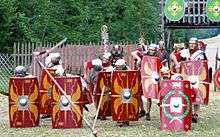Definify.com
Webster 1913 Edition
Legion
Le′gion
(lē′jŭn)
, Noun.
1.
(Rom. Antiq.)
A body of foot soldiers and cavalry consisting of different numbers at different periods, – from about four thousand to about six thousand men, – the cavalry being about one tenth.
2.
A military force; an army; military bands.
3.
A great number; a multitude.
Where one sin has entered,
legions
will force their way through the same breach. Rogers.
4.
(Taxonomy)
A group of orders inferior to a class.
Legion of honor
, an order instituted by the French government in 1802, when Bonaparte was First Consul, as a reward for merit, both civil and military.
Webster 1828 Edition
Legion
LE'GION
,Noun.
1.
In Roman antiquity, a body of infantry consisting of different numbers of men at different periods, from three to five thousand. Each legion was divided into ten cohorts, each cohort into ten companies, and each company into two centuries.2.
A military force; military bands.3.
A great number.Where one sin has entered, legions will force their way through the same breach.
My name is legion, for we are many. Mark 5.
Definition 2026
Legion
legion
legion
English

Reenactment of a Roman legion.
Adjective
legion (not comparable)
- Numerous; vast; very great in number; multitudinous.
- Russia’s labor and capital resources are woefully inadequate to overcome the state’s needs and vulnerabilities, which are legion.
Translations
Noun
legion (plural legions)
- (military, Ancient Rome) The major unit or division of the Roman army, usually comprising 3000 to 6000 infantry soldiers and 100 to 200 cavalry troops.
- (military, obsolete) a combined arms major military unit featuring cavalry, infantry, and artillery
- (military) A large military or semimilitary unit trained for combat; any military force; an army, regiment; an armed, organized and assembled militia.
- (often Legion or the Legion) A national organization or association of former servicemen, such as the American Legion, founded in 1919.
- A large number of people; a multitude.
- (often plural) A great number.
- Where one sin has entered, legions will force their way through the same breach. — John Rogers (1679-1729) Google Books
- (dated, taxonomy) A group of orders inferior to a class; in scientific classification, a term occasionally used to express an assemblage of objects intermediate between an order and a class.
Synonyms
Meronyms
Coordinate terms
- (military unit): fireteam, section, troop, squad, platoon, company, battalion, regiment, brigade, division, corps, wing, army, army group
- (combined arms): combat team, regimental combat team, brigade combat team
Related terms
Derived terms
Translations
the major unit or division of the Roman army
Quotations
- 1606, William Shakespeare, Macbeth, Act IV Scene iii
- MACDUFF. Not in the legions / Of horrid ****, can come a devil more damn'd / In evils to top Macbeth.
- 1611, Bible, King James Version
- Mark 5:9
- And he asked him, What is thy name? And he answered, saying, My name is Legion: for we are many.
- Matthew 26:53
- Thinkest thou that I cannot now pray to my Father, and he shall presently give me more than twelve legions of angels?
- Mark 5:9
- 1708, John Philips, Cyder, Book II, Google Books
- Now we exult, by mighty ANNA's Care / Secure at home, while She to foreign Realms / Sends forth her dreadful Legions, and restrains / The Rage of Kings
- 1745, Edward Young, Night Thoughts, Google Books
- What can preserve my life, or what destroy ? / An angel's arm can't snatch me from the grave; / Legions of angels can't confine me there.
- 1821, Lord Byron, Sardanapalus, Act IV Scene i, Google Books
- SAR. I fear it not; but I have felt—have seen— / A legion of the dead.
Anagrams
References
-
 Legion (biology) on Wikipedia.Wikipedia
Legion (biology) on Wikipedia.Wikipedia
Esperanto
Etymology
Pronunciation
- IPA(key): /leˈɡion/
- Hyphenation: le‧gi‧on
- Rhymes: -ion
Noun
legion
- accusative singular of legio